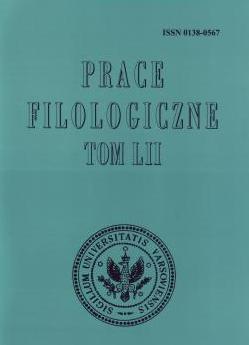Czasowniki nazywające czynności mowy i ich nieagentywne odpowiedniki. Wstęp do analizy semantycznej z perspektywy opozycji agentywności i kauzatywnośc
Verbs of Speech and their Non-Agentive Couterparts. A preliminary semantic analysis from the perspective of the opposition of agentivity and causativi
Author(s): Izabela Duraj-NowosielskaSubject(s): Language and Literature Studies
Published by: Wydział Polonistyki Uniwersytetu Warszawskiego
Keywords: opozycja; agentywność; kauzatywność; podmiot; opposition; agentivity; causativity; subject
Summary/Abstract: The article deals with a subgroup of speech act verbs, e.g. {mówić / powiedzieć, wyjaśniać / wyjaśnić, sugerować / zasugerować} (‘tell’ imperf./perf., ‘explain’ imperf./perf., ‘suggest’ imperf./perf.). The characteristic feature of these verbs is that besides primary “personal” subjects {(ktoś, ‘somebody’)} they accept also “situational” subjects (coś, ‘something’). It means that formal, unilateral units enter into two kinds of bilateral units: agentive speech-units (with speaking subject - “somebody”, e.g. {[ktoś] mówi / powiedział [komuś] [coś], [ktoś] wyjaśnia / wyjaśnił [komuś] [coś], [ktoś] sugeruje / zasugerował [komuś] [coś]}, ‘[somebody] tells / told [somebody] [something]’, ‘[somebody] explains / explained [somebody] [something]’, ‘[somebody] suggests / suggested [somebody] [something]’) and non-agentive (with “situational” subjects - “something”, e.g. {[coś] [komuś] powiedziało / mówi [coś], [coś] [komuś] wyjaśniło / wyjaśnia [coś], [coś] [komuś] zasugerowało/ sugeruje [coś]}, ‘[something] told / tells [somebody] [something]’, ‘[something] explained / explains [somebody] [something]’, ‘[something] suggested / suggests [somebody] [something]’). Besides the difference of subjects, the two types of units distinguished above differ also in other features, the most important of which are: 1) causative implication or the lack of it; 2) the form of object-complements; 3) neutral word-order and intonation of sentences. The opposition of agentive and non-agentive verbs regarding these features is discussed in the first three chapters of Part I of the article (Duraj-Nowosielska 2004). Part II (chapters 4, 5) is devoted to border-line constructions: in chapter 4 I discuss sentences like {Jan ją obraził swoim zachowaniem}, ‘Jan offended her behaving like that’, i.e. “causative” sentences with “personal” subjects, and in chapter 5 - sentences like {Ten napis mówi, że teraz trzeba skręcić w lewo}, ‘The inscription says that now one should turn left’, i.e. agentive sentences with surface “non-personal” subjects. In the article I try to find the most appropriate interpretation for this kind of examples, since it is them that throw light on some essential problems connected with the opposition of agentivity and causativity in the field of speech act verbs.
Journal: Prace Filologiczne
- Issue Year: 2007
- Issue No: 52
- Page Range: 59-88
- Page Count: 30
- Language: Polish

